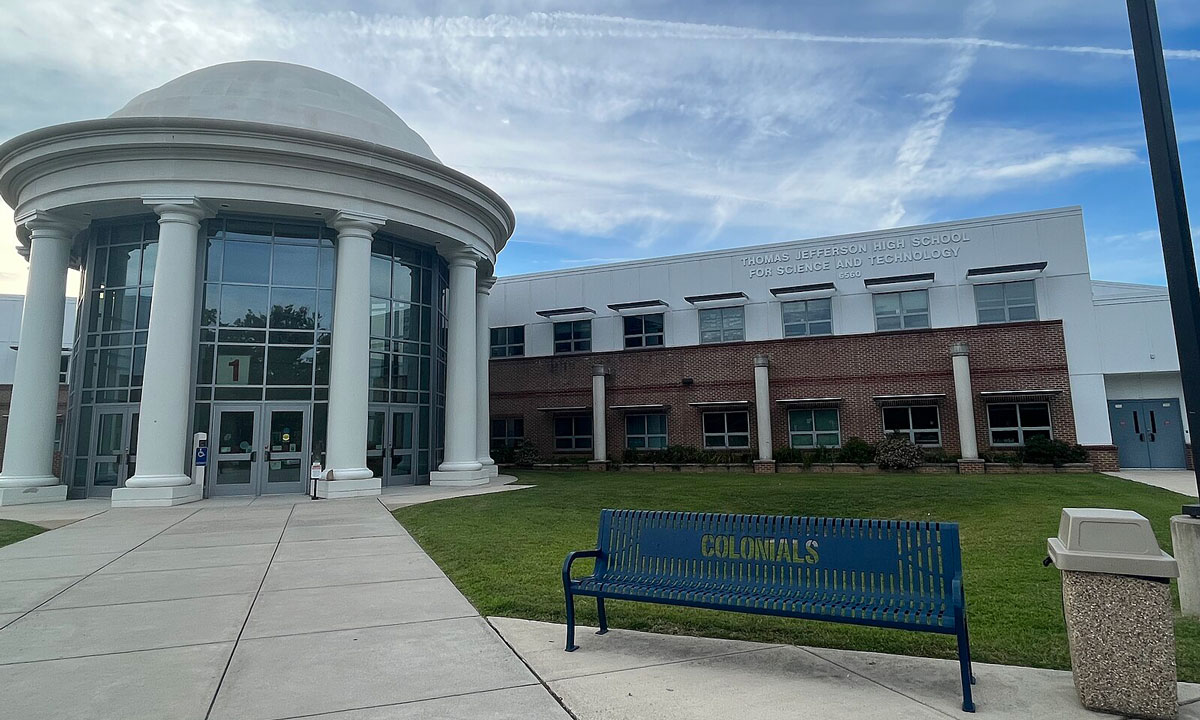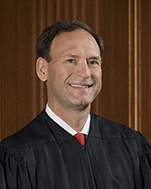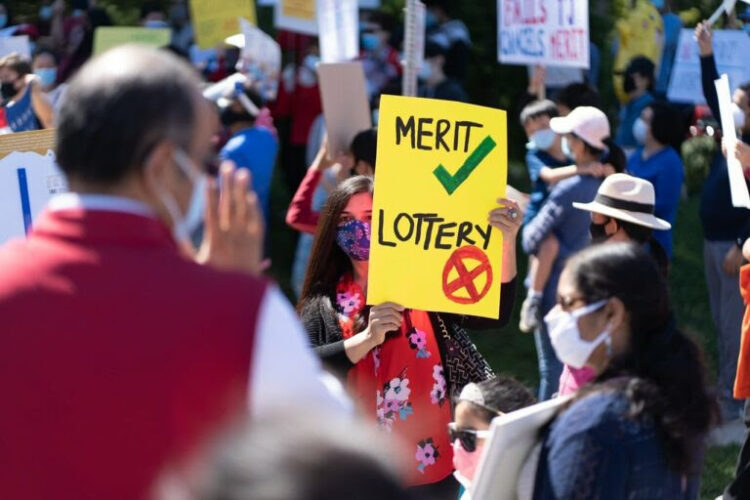Supreme Court Won’t Hear Challenge to Admissions Policy at Elite Virginia High School
The move drew a sharp dissent from two conservative justices, who called a lower court’s reasoning “indefensible.”

Get stories like this delivered straight to your inbox. Sign up for The 74 Newsletter
The U.S. Supreme Court on Tuesday denied a request to hear a lawsuit that could have interrupted districts’ efforts to increase diversity at elite K-12 schools.
Following last year’s decision ending race-conscious admissions in higher education, the move suggests the court is satisfied for now with the selection process at magnets, STEM schools and other K-12 schools that require students to apply.
In 2020, the Fairfax district in northern Virginia changed its admissions criteria to better reflect the racial makeup of students in the county. Last May, the U.S. Court of Appeals for the Fourth Circuit upheld the plan.
The Supreme Court offered no explanation for its refusal to hear the case. But a dissent from Justice Samuel Alito, backed by Justice Clarence Thomas, called the lower court’s ruling in Coalition for TJ v. Fairfax County School Board, “a virus that may spread if not promptly eliminated.”

“What the Fourth Circuit majority held, in essence, is that intentional racial discrimination is constitutional so long as it is not too severe,” Alito wrote. “This reasoning is indefensible, and it cries out for correction.”
The Supreme Court’s earlier ruling against Harvard and the University of North Carolina over affirmative action-based admissions left some districts in limbo over whether K-12 integration efforts based on family income, rather than race, could pass legal muster. Echoing arguments similar to those that Students for Fair Admissions made against affirmative action in higher education, the Fairfax parents said admissions changes at Thomas Jefferson High School for Science and Technology make it more difficult for Asian-American students to be accepted.
Before Fairfax changed its admissions rules, about three-fourths of the school’s students were Asian Americans. District leaders eliminated a rigorous test for applicants and a $100 fee. And they reserved seats at the school for the top 1.5% of 8th graders in each middle school. Coalition for TJ said the new rules were racially biased because the proportion of Asian American students accepted dropped to 54%.
“The Supreme Court missed an important opportunity to end race-based discrimination in K-12 admissions,” Joshua Thompson, a senior attorney with the conservative Pacific Legal Foundation, said in a statement Tuesday. The firm represents the Fairfax parents who sued. “Schools should evaluate students as individuals, not as groups based on racial identity.”
But some integration experts say the court’s decision not to hear the case confirms that using socioeconomic status in admissions is constitutional. Richard Kahlenberg, a fellow at the Progressive Policy Institute, called the court’s denial “a victory for poor and working class students of all races.” On behalf of the plaintiffs in the cases against Harvard and UNC, he testified in favor of socioeconomic integration, but said Tuesday that both that earlier opinion and the court’s denial of the TJ case fit with an ongoing public consensus in “support of racial diversity, but in opposition to using racial preferences to get there.”
“The decision of seven justices not to hear the case makes good sense because for three decades, even the most conservative justices have been urging educational institutions to use precisely the kind of race-neutral strategies that Thomas Jefferson High School employed,” he said.
Supporters of the admissions changes note the current average GPA of incoming students, 3.9, is higher than it was under the previous policy.
“We have long believed that the new admissions process is both constitutional and in the best interest of all of our students,” Karl Frisch, chair of the district’s board, said in a statement. “It guarantees that all qualified students from all neighborhoods in Fairfax County have a fair shot at attending this exceptional high school.”
The ‘best public schools’
The Supreme Court’s denial of the TJ appeal is the second blow in three months to Pacific Legal’s efforts to curb what it sees as discrimination against white and Asian American students in K-12. In December, the U.S. Court of Appeals for the First Circuit ruled against the firm’s clients in a similar case over selective schools in Boston.
Following the opinion’s release, Erin Wilcox, another Pacific Legal attorney, said it was disappointing that just six months after the court’s affirmative action ruling, “the First Circuit held … that it’s perfectly legal for Boston to use racial proxies to determine who is admitted to some of its best public schools.”
Pacific Legal plans to go back to the High Court in the next few weeks to ask the justices to examine many of the same issues it objected to in the TJ case.
But Stefan Lallinger, executive director at Next100, a progressive think tank affiliated with The Century Foundation, called the First Circuit’s decision “a shot in the arm to districts that understand the value of diversity,” but were left “confused or worse, afraid, to take bold and affirmative steps” after the Supreme Court’s opinion on Harvard and UNC.

The Boston Public Schools made changes similar to those in Fairfax. The district replaced a merit-based admissions policy for its exclusive “exam” schools with one that drew students with high GPAs from all ZIP codes. (The system was later changed to reflect census tracts — small geographic areas within a county.)
The Boston Parent Coalition for Academic Excellence Corp., a nonprofit, sued last year over the policy change, which has led to more Black and Hispanic students attending the schools.
Pacific Legal is also representing plaintiffs suing over criteria for entrance to highly competitive schools in Montgomery County, Maryland, and New York City. And in January, the firm filed a lawsuit on behalf of a group of New York parents over a statewide program that prepares students to study STEM fields in college. The plaintiffs argue that the criteria favors Black, Hispanic, Alaskan Native and American Indian students regardless of their family’s income.
In Philadelphia, the American First Legal Foundation, another conservative law firm, sued in 2022 after the district dropped merit-based application requirements, such as recommendation letters, attendance and test scores, for competitive schools. District leaders moved to a lottery system in which students from certain ZIP codes receive preference. The system targets neighborhoods with the lowest representation of students who previously accepted offers to attend those schools.
The case is currently pending in federal district court.
Get stories like these delivered straight to your inbox. Sign up for The 74 Newsletter

;)
